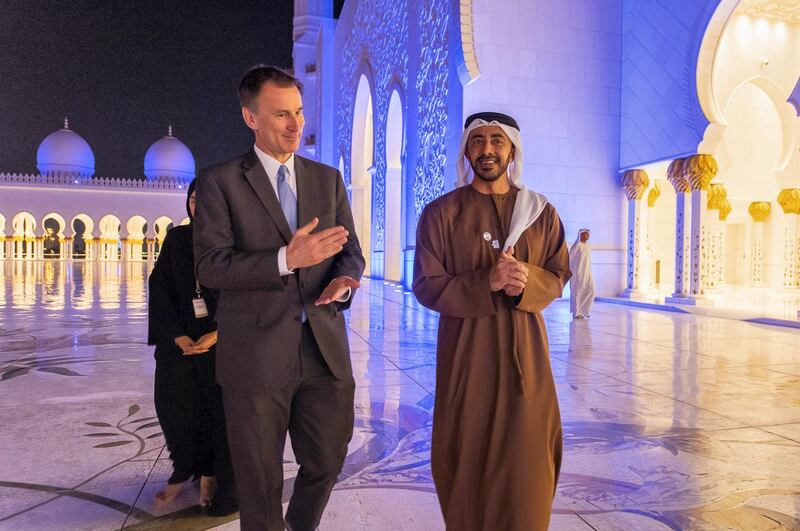British Foreign Secretary Jeremy Hunt visited the Sheikh Zayed Grand Mosque in Abu Dhabi on Sunday during the last leg of a four-country tour of the Middle East.
Mr Hunt praised the UAE's declaration of 2019 as the Year of Tolerance in his second official visit to the country since becoming foreign minister.
"Building greater understanding amongst communities is a key and welcome part of UAE’s #YearofTolerance," he wrote on Twitter.
Just visited the beautiful Sheikh Zayed Grand Mosque in #AbuDhabi with HH @ABZayed this evening. Building greater understanding amongst communities is a key and welcome part of UAE’s #YearofTolerance #عام_التسامح pic.twitter.com/csCfEl6NaT
— Jeremy Hunt (@Jeremy_Hunt) March 3, 2019
Mr Hunt was received earlier on Sunday by Sheikh Abdullah Al Nahyan, Minister of Foreign Affairs and International Co-operation before meeting with Dr Anwar Gargash, Minister of State for Foreign Affairs, and Dr Sultan Al Jaber, Minister of State.
On Saturday Mr Hunt met Saudi Minister of State for Foreign Affairs Adel Al Jubeir and held discussions that focused on joint action to combat terrorism and extremism.
The officials discussed a fragile truce in the Yemeni city of Hodeidah with Yemeni President Abdrabu Mansur Hadi, who is based in Riyadh.
According to Saudi Press Agency (SPA), the meeting touched on historical relations binding the countries, in addition to the latest regional and international developments.
Mr Hunt's visit came after he failed last month to convince Germany to end its ban on arms exports to Saudi Arabia, which he said was hurting Europe's defence industry and diminishing its influence in efforts to end the Yemen conflict.
"Important discussion with @AdelAljubeir about human rights reforms and current issues including [Jamal] Khashoggi, women activists," Mr Hunt said on Twitter, without offering any details.
Excellent first meeting with FM Ibrahim al Assaf & @AdelAljubeir today in Riyadh. Our strategic partnership w/Saudi Arabia helps us to keep the UK safe, to make progress on diplomatic priorities like Yemen, and to discuss frankly issues of concern pic.twitter.com/X2JMyzP64r
— Jeremy Hunt (@Jeremy_Hunt) March 2, 2019
"Our strategic partnership [with] Saudi Arabia helps us to keep the UK safe, to make progress on diplomatic priorities like Yemen, and to discuss frankly issues of concern," Mr Hunt said.
Mr Hunt complained, however, about slow implementation of a ceasefire deal in rebel-held Hodeidah, which was agreed in Sweden in December between Yemen's Saudi-backed government and Houthi rebels.
The deal was hailed as Yemen's best chance to end the four-year conflict, but it appears to be hanging by a thread with reported breaches by the Iran-backed rebels.
"There is a lack of trust and it is taking too long to implement the Stockholm [deal] but no one has a better plan so we need to get going and end the crisis," Mr Hunt tweeted after a meeting with Yemen’s Mr Hadi.
Progress fragile but within sight for UN-backed peace talks on Yemen, as I discussed with Yemeni President Hadi in Riyadh today. There is a lack of trust and it is taking too long to implement Stockholm but no one has a better plan so we need to get going and end the crisis... pic.twitter.com/ZRjcwkndQ5
— Jeremy Hunt (@Jeremy_Hunt) March 2, 2019
He also travelled to Oman where he met the leader, Sultan Qaboos, in Muscat and discussed regional issues.
“Honoured to meet HM Sultan Qaboos in Muscat today and to hear his views on a host of bilateral, regional and wider international issues. [Great Britain and Oman] have enjoyed 200+ years of close friendship @UKinOman,” he said.
He then travelled to the southern Yemeni city of Aden, where he met with government officials.
Just completed Yemen visit. My thoughts, from the port of Aden, on why the situation could spiral back quickly to full scale war and what needs to happen to stop that pic.twitter.com/pzTPJdNBA8
— Jeremy Hunt (@Jeremy_Hunt) March 3, 2019
Mr Hunt urged Germany last month to exempt major European defence projects like the Eurofighter or Tornado jets, which contain German parts, from its Saudi weapons embargo.
But Berlin stood firm on its decision to uphold the embargo.





